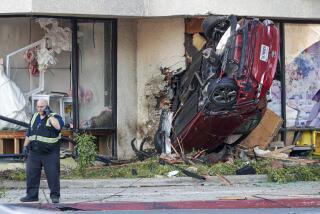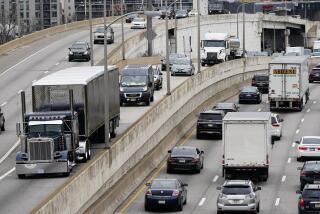Car Safety Study Urges Rear Seat Shoulder Belts
- Share via
WASHINGTON — The National Transportation Safety Board today urged the government to require shoulder safety belts in the rear seats of all new automobiles, saying a study of injuries to rear-seat passengers indicates lap belts may do more harm than good.
The safety board, in a report examining 26 crashes in which there were serious injuries to passengers wearing lap belts, said that in many cases the passenger was injured more severely from the effects of the belt and might have been better off not wearing one.
The federal government for years has required auto makers to install shoulder belts for front-seat passengers, but requires only lap belts for the rear seats. Several auto makers recently have announced plans to adopt the shoulder belts for rear seats as well.
Lap-Only Belts Ineffective
Patricia Goldman, the NTSB’s acting chairman, said the agency’s study shows that lap-only belts are ineffective in preventing death and serious injury.
“We don’t know whether it is best for rear-seat passengers to ride with only a lap belt or without one,” Goldman said.
She emphasized that the safety agency still believes that use of shoulder belts dramatically decreases the chance of serious injuries in auto accidents.
But the NTSB study focused exclusively on how well passengers are protected by the lap-only belts.
That study showed that “overall the crash performance of the lap belts in these cases was very poor.”
Its study said that among 50 accident victims who used lap-only belts at least 32 would have “fared substantially better if they had been wearing a lap-shoulder belt.
Can Induce Injuries
“In many cases the lap belts induced severe to fatal injuries that probably would not have occurred if the lap belts had not been worn.”
The study said 26 of the people who wore lap-only belts were found to have sustained serious or fatal injuries in the crashes, while other occupants, even some wearing no belt at all, were injured less seriously or not injured at all.






